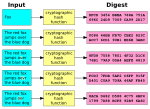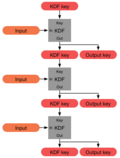In cryptography, cryptographic hash functions can be divided into two main categories. In the first category are those functions whose designs are based...
13 KB (1,811 words) - 20:15, 26 August 2024
A cryptographic hash function (CHF) is a hash algorithm (a map of an arbitrary binary string to a binary string with a fixed size of n {\displaystyle n}...
48 KB (6,237 words) - 06:56, 21 October 2024
general and technical information for a number of cryptographic hash functions. See the individual functions' articles for further information. This article...
16 KB (806 words) - 20:08, 6 August 2024
The Secure Hash Algorithms are a family of cryptographic hash functions published by the National Institute of Standards and Technology (NIST) as a U...
3 KB (464 words) - 07:05, 4 October 2024
This is a list of hash functions, including cyclic redundancy checks, checksum functions, and cryptographic hash functions. Adler-32 is often mistaken...
10 KB (280 words) - 12:41, 17 October 2024
The non-cryptographic hash functions (NCHFs) are hash functions intended for applications that do not need the rigorous security requirements of the cryptographic...
7 KB (796 words) - 04:17, 23 August 2024
security (in particular, cryptographic hash functions), collision avoidance has become an important topic in computer security. Hash collisions can be unavoidable...
9 KB (1,130 words) - 16:51, 9 August 2024
science and cryptography, Whirlpool (sometimes styled WHIRLPOOL) is a cryptographic hash function. It was designed by Vincent Rijmen (co-creator of the Advanced...
11 KB (1,054 words) - 03:57, 19 March 2024
Comparison of cryptographic hash functions Cryptographic hash function Collision attack Preimage attack Length extension attack Cipher security summary Tao...
17 KB (1,055 words) - 12:18, 2 March 2023
computer security systems. These routines include, but are not limited to, one-way hash functions and encryption functions. When creating cryptographic systems...
6 KB (814 words) - 02:12, 9 May 2024
Hash-based cryptography is the generic term for constructions of cryptographic primitives based on the security of hash functions. It is of interest as...
20 KB (2,329 words) - 09:31, 3 September 2024
Although it can be used to ensure security, SipHash is fundamentally different from cryptographic hash functions like Secure Hash Algorithms (SHA) in that it...
14 KB (1,342 words) - 05:08, 21 August 2024
In cryptography, security level is a measure of the strength that a cryptographic primitive — such as a cipher or hash function — achieves. Security level...
13 KB (1,360 words) - 04:38, 10 May 2024
ShangMi 3 (SM3) is a cryptographic hash function used in the Chinese National Standard. It was published by the National Cryptography Administration (Chinese:...
3 KB (287 words) - 17:06, 16 November 2023
BLAKE is a cryptographic hash function based on Daniel J. Bernstein's ChaCha stream cipher, but a permuted copy of the input block, XORed with round constants...
30 KB (2,848 words) - 05:59, 18 August 2024
HMAC (redirect from Keyed-Hashing Message Authentication)
code) is a specific type of message authentication code (MAC) involving a cryptographic hash function and a secret cryptographic key. As with any MAC, it...
18 KB (2,335 words) - 04:57, 18 October 2024
credentials to Internet security. Salts are related to cryptographic nonces. Without a salt, identical passwords will map to identical hash values, which could...
13 KB (1,533 words) - 23:19, 23 October 2024
cryptography, Tiger is a cryptographic hash function designed by Ross Anderson and Eli Biham in 1995 for efficiency on 64-bit platforms. The size of a...
9 KB (910 words) - 14:47, 30 September 2023
function (which typically uses a cryptographic hash function or block cipher). KDFs can be used to stretch keys into longer keys or to obtain keys of...
13 KB (1,641 words) - 06:40, 27 October 2024
compression functions are for instance used in the Merkle–Damgård construction inside cryptographic hash functions. One-way compression functions are often...
24 KB (3,977 words) - 03:22, 7 June 2024
Avalanche effect (redirect from Avalanche (cryptography))
In cryptography, the avalanche effect is the desirable property of cryptographic algorithms, typically block ciphers and cryptographic hash functions, wherein...
5 KB (568 words) - 17:23, 14 December 2023
The MD2 Message-Digest Algorithm is a cryptographic hash function developed by Ronald Rivest in 1989. The algorithm is optimized for 8-bit computers....
9 KB (1,053 words) - 18:49, 15 September 2024
cryptographic primitives, including cryptographic hashes, message authentication codes, mask generation functions, stream ciphers, pseudo-random number...
7 KB (811 words) - 14:51, 1 November 2024
Cryptographic Information Security – Hash Function. The equivalent standard used by other member-states of the CIS is GOST 34.311-95. This function must...
16 KB (2,206 words) - 02:44, 11 July 2024
Preimage attack (redirect from Hash function preimage)
cryptography, a preimage attack on cryptographic hash functions tries to find a message that has a specific hash value. A cryptographic hash function...
7 KB (895 words) - 15:44, 13 April 2024
Merkle tree (redirect from Tiger-Tree Hash)
In cryptography and computer science, a hash tree or Merkle tree is a tree in which every "leaf" node is labelled with the cryptographic hash of a data...
15 KB (1,788 words) - 20:42, 10 September 2024
vectors and in cryptographic hash functions. A nonce is an arbitrary number used only once in a cryptographic communication, in the spirit of a nonce word...
7 KB (906 words) - 17:31, 29 July 2024
In cryptography, N-hash is a cryptographic hash function based on the FEAL round function, and is now considered insecure. It was proposed in 1990 in an...
2 KB (213 words) - 21:43, 31 December 2023
A hash function is any function that can be used to map data of arbitrary size to fixed-size values, though there are some hash functions that support...
50 KB (7,445 words) - 00:27, 29 October 2024
SHA-1 (redirect from SHA-1 hash)
In cryptography, SHA-1 (Secure Hash Algorithm 1) is a hash function which takes an input and produces a 160-bit (20-byte) hash value known as a message...
50 KB (5,744 words) - 19:28, 20 October 2024









